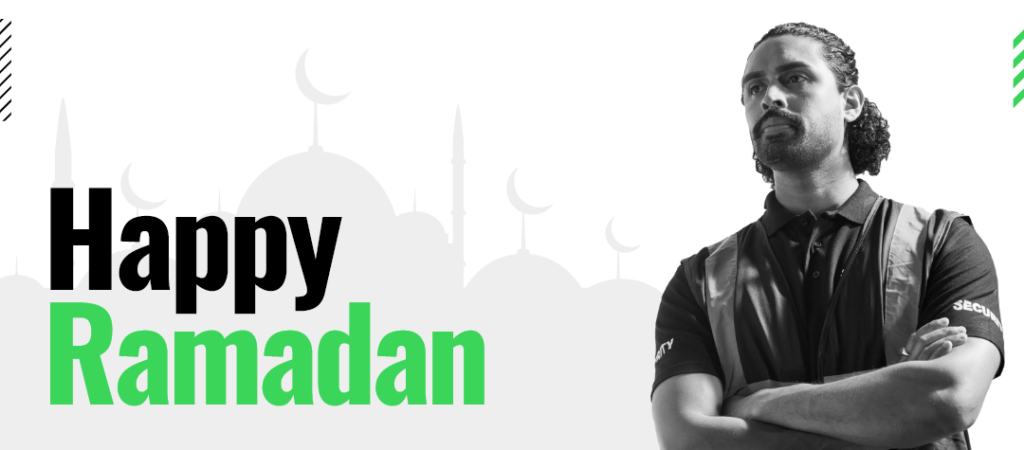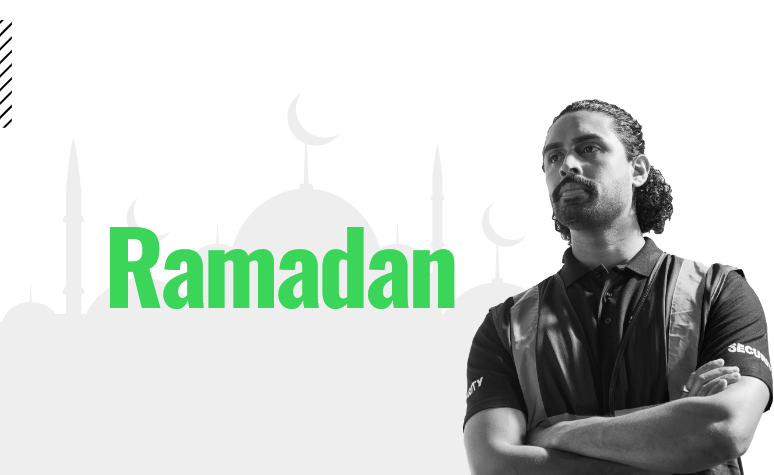Being a security professional can be a physically demanding job, and you might be on your feet all day or night, often walking or running. And when you are fasting for Ramadan, it can be a challenge. This blog explains more about Ramadan for non-Muslims and has top tips for security personnel and bosses during this religious festival.
Ramadan is the holy month of fasting practised by Muslim people. This year it is expected to begin in the evening on Wednesday, March 22, 2023, and end on Thursday, April 20, 2023.
Ramadan is not like Christmas for Christians in that it is celebrated on the same day each year. Ramadan is based on the Muslim calendar that follows lunar months, and this means that it begins ten to twelve days earlier each year—so over 33 years. Ramadan falls in every month.
The prophet saws stated. “Winter is the best season for the believer. Its nights are long for him to pray in, and its days are short for him to fast in.”
While Ramadan in Spring is more manageable than in the Summer, you can expect to fast in the UK for around 14 hours in March and April. Morning prayers (Fajr) begin from 4:15 am to 5:14 am this year but vary from city to city. The fast is broken at Maghrib, which occurs from around 6:20 pm to 8:09 pm.
So it is not as tough as in 2014! That year, Ramadan began on Sunday, June 29 and ended at sundown on Monday, July 28.
The Central Mosque in London recorded brutal earliest Fajr times at 2:48 am, with the fast not broken until 9:26 pm and Isha prayers at 11:03 pm.
Ever heard of being angry?
It’s the state of being irritable or bad-tempered because you are hungry. Most people experience it when their meals are delayed more than is typical for them. That is something that, as a Muslim, you need to work with. Years of fasting will help your body and mind to adjust to the gruelling nature of fasting. Being spiritually strong will help you to control your temper and bite your tongue. Remember, as a security guard, it’s your job to diffuse potential aggression, so you must keep calm and level-headed.
Praying to Allah for guidance is the key to fasting for Ramadan. If you are working as a security guard during Ramadan, you may want to speak to a supervisor to let them know you are fasting. If you are on shift, when you need to break your fast and pray, you’ll need to pre-arrange this with a supervisor.
A wise Muslim is also an organised one. The mosque you attend will give you all the times for your prayers to follow each day so that you can use this as a guide and balance it as best you can with your work rota.
While you are fasting, there are various ways that your employer can help you. If issues in your workplace will make it difficult for you, and your employer still needs to address these, then speak to your line manager or human resources department. Employers can help you in various ways, which include:
Being respectful
Ramadan can be a personal experience for everyone, and everyone has their own spirituality. Many Muslims are excited about their faith and are happy to share their faith and discuss the teachings of the Quran. Others are more private in their religious beliefs. Some Muslims may prefer to be treated with extra care during Ramadan, as it is certainly not easy. Conversely, others may not wish to be treated any differently.
It’s also important to note that Ramadan is unlike a Christian fast, where water is taken. Muslims do not eat, drink, chew gum or smoke during fasting times. During Ramadan, taking medication with or without water is also forbidden. For this reason, you’ll find that many Muslims cannot fast for health reasons if they are required to take daily medication. Women also do not fast at various times, such as when they are pregnant or breastfeeding, and many Muslims find their fasting activities can be revealing about their private health matters.
An excellent way to address a personal issue like this would be to pass an email to all staff members. This can be to educate non-Muslims about Ramadan and invite any staff member who requires support during Ramadan to contact HR or their line manager.
Building a partnership with local mosques can help businesses to create a more respectful and inclusive workplace. It’s also a great way to learn about ideas for better working practices at this special time of the year for Muslims.
Being Educated
Educating line managers and staff members about Ramadan and fasting can help you build a more respectful working environment. Obviously, going without food and water for a prolonged period is going to present issues. Here are a few practical ideas that can help
- Ensure line managers do not overburden fasting staff with extra duties or overtime.
- Vast displays of food are not helpful to people who are fasting (or dieting)! So, avoid making a big deal of Birthday cakes or lunches. Also, try to avoid working lunches and team meetings where coffee, tea and biscuits are on offer are also very distracting for people avoiding food.
- Create places where Muslims can pray and respect the times they need to break from their duties.
- Recognising that as the fast continues throughout the day, energy levels can become low. Schedule more important meetings or appraisals, therefore, earlier in the day.
Being Flexible
As we have already explained, Ramadan has very fixed times for prayers and fasting. Be aware that Muslims will be getting up earlier and would probably prefer to be at home when they end their fast to celebrate with family. If you can adjust schedules, it will benefit not just a fasting staff member but also you as a business, as you’ll be getting the best from your staff when they are more focused and energised. If lunch is usually an hour, many Muslims would prefer a shorter break; after all, they are not eating. This can allow them to finish their shift sooner and be able to get back to attend prayers and be with other Muslims.
Accommodate annual leave requests where possible
It’s typical for businesses in the UK to be shut for at least two days over Christmas. Many people prefer to take a few extra days of paid leave between New Year when, once again, most businesses close for a further two days. And some companies are shut from Xmas Eve to January 2 or 3rd. As many businesses are shut, those that don’t celebrate Christmas have little option but to take paid leave when they prefer not to.
It’s natural for Muslims to want to take time off during Ramadan, so special consideration should be given to this. This year, because Ramadan is in Spring, it clashes with Easter. So this is a tough call if everyone is requesting time off. The key is to be consistent and not be seen to favour either request.
If your firm isn’t as clued up as you think it could be, you could politely give them some of your own or our ideas to make Ramadan an easier experience. Most employers are happy to explore a more inclusive working environment as it benefits them if they can help you to be as productive as possible.
So remember, stay calm, alert, peaceful, physically and spiritually strong and have a wonderful Ramadan.
Ramadan Mubarak to everyone.



Leave a Reply